Servant of the Bones Read online
Page 2
Was there enough for him, he had asked. I had almost laughed.
"Of course, my friend, dear God, take anything you want."
And he drank the water down in greedy gulps, saying it was all he needed now, that once again the Stairway to Heaven had disappeared and left him stranded.
"My name is Azriel," he said, sitting by the bed. "They called me the Servant of the Bones," he said, "but I became a rebel ghost, a bitter and impudent genii."
He unfurled the magazine for me to see. My head was clear. I sat up, propped by the divine luxury of clean pillows. He looked as unlike a ghost as a man can look, muscular, brimming with life, the dark hair on the backs of his hands and on his arms making him appear all the more strong and vital.
Gregory Belkin's face stared forward from the famous Time magazine frame. Gregory Belkin--Esther's father--founder of the Temple of the Mind. The man who would have brought harm to millions.
"I killed that man," he said.
I turned to look at him, and then it was that I first saw the miracle.
He wanted me to see it. He did it for me.
He had grown smaller in size, though only slightly; his mane of tangled black curls was gone; he had the trimmed hair of a modern businessman; even his large loose shirt was changed for the supremely acceptable and impeccably tailored black suit, and he had become...before my very eyes...the figure of Gregory Belkin.
"Yes," he said. "It was the way I looked on the day I made my choice, to forfeit my powers forever; to take on real flesh and real suffering. I looked just like Gregory when I shot him."
Before I could answer, he began to change again, the head to grow larger, the features to become broader, forehead stronger and more distinctive, the cherub mouth of his own to replace the thin line of Belkin's. His fierce eyes grew large beneath the thick eyebrows that tended to dip as he smiled, making the smile and immensity of the eyes seem secretive and seductive.
It was not a happy smile. It had no humor or sweetness in it. "I thought I would look this way forever," he said, holding up the magazine for me to see. "I thought I would die in that form." He sighed. "The Temple of the Mind lies in ruins. The people will not die. The women and children will not fall on the road as they breathe the evil gas. But I didn't die. I am Azriel again."
I took his hand. "You're a living breathing man," I said. "I don't know how you made yourself look like Gregory Belkin."
"No, not a man--a ghost," he said, "a ghost so strong that he can wrap himself in the form he had when he was alive; and now he cannot make it go away. Why did God do this to me? I am not an innocent being; I have sinned. But why can't I die?"
Suddenly a smile came over his face. He was almost a boy, the tangled curls making their dark frame for his low cheeks and the large beautiful cherub mouth.
"Maybe God let me live to save you, Jonathan. Maybe that's all it was. He gave me my old flesh back so I could climb this mountain and tell you all this, and you would have died had I not come here."
"Perhaps, Azriel," I said.
"You rest now," he said. "Your forehead is cool. I'll wait, and I'll watch, and if you see me, now and then, turn into that man again, it is only that I'm trying to measure each time the difficulty of it. It was never so very hard for me to change my shape--for the sorcerer who called me up from the bones. It was never so hard for me to throw an illusion to trick my master's enemies or those he would rob or cheat.
"But it's hard now to be anything but the young man I was when it started. When I bought their lies. When I became a ghost and not the martyr they promised. Lie still now, Jonathan, sleep. Your eyes are clear and your cheeks have color."
"Give me more of the broth," I said. He did.
"Azriel, I would be dead without you."
"Yes, that much is true, isn't it? But I had my foot on the Ladder to Heaven, I was on it this time, I tell you, when I made this choice, and I thought when it was all over, the Temple destroyed, the Stairway might come down for me again. The Hasidim are pure and innocent. They are good. But battles they must leave to monsters like me."
"Lord, God," I said. Gregory Belkin. A lunatic plan. I remember fragments..."And there was that beautiful girl," I said.
He put down the cup of broth, and wiped my face and my hands.
"Her name was Esther."
"Yes."
He opened the curled and damp magazine for me. It was now badly creased as it was drying out in the warm room. I saw the famous photograph of Esther Belkin, on Fifth Avenue. I saw her lying on the stretcher just before they had put her into the ambulance, and just before she had died.
Only this time I focused on a figure in this photograph which I had noticed before, yes, in television broadcasts, and in the larger cover photographs of this very scene. But I hadn't until now paid any real attention to the figure. I saw a young man by Esther's stretcher, with his hands raised to his head, as though crying out in grief for her, a young man blurry and indistinct as all the other crowd figures in the famous photograph, except for his heavy beautifully shaped eyebrows and his mane of thick black curly hair.
"That's you," I said. "Azriel, that's you there in the photograph."
He was distracted. He didn't reply. He put his finger on the figure of Esther. "She died there, Esther, his daughter."
I explained that I had known her. The Temple was new then, and controversial rather than solid and immense and indefatigable. She had been a good student, serious and modest and alert.
He looked at me for a long time. "She was a sweet, kind girl, wasn't she?"
"Yes, very much so. Very unlike her stepfather."
He pointed to his own shape in the picture.
"Yes, the ghost, the Servant of the Bones," he said. "I was visible then in my grief. I will never know who called me. Maybe it was only her death, the dark horrible beauty of it. I'll never know. But you see now, you feel now, I have the solid shape of that form which was nothing before but vapor. God has wrapped me in my old flesh; he makes it harder and harder for me to vanish and return; to take to the air and to nothingness and to reassemble. What is to become of me, Jonathan? As I grow stronger and stronger in this seeming human form, I fear I can't die. I will never."
"Azriel, you must tell me everything."
"Everything? Oh, I want to, Jonathan. I want to."
Within an hour, I was able to walk about the house without dizziness. He'd found my thick robe for me, and my leather slippers. Within a few more hours I was hungry.
It must have been morning when I fell asleep. And then waking in the later afternoon, I was myself, clearheaded, sharp, and the house was not only safely warmed by the fire, but he had put a few candles around, the thick kind, so that the corners had a dusty soft nonintrusive light.
"Is it all right?" he asked me gently.
I told him to put out a few more. And to light the kerosene lamp on my desk. He did these things with no trouble. A match was no mystery to him, or a cigarette lighter. He raised the wick of the lamp. He put two more of the candles on the stone-top table by the bed.
The room, with its wooden windows bolted shut as tight as its door, was softly, evenly visible. The wind howled in the chimney. Again came the volley of flakes dissolving in the heat. The storm had slackened but the snow still fell. The winter surrounded us.
And no one will come, no one will disturb us, no one will distract us. I stared at him in keen interest. I was happy. Uncommonly happy.
I taught him how to make cowboy coffee by merely throwing the grinds into the pot, and I drank plenty of it, loving the smell of it.
Though he wanted to do it, I mixed up the grits for a good meal, showing him again how it came in little packets, and all one had to do was boil the water on the fire, and then stir the grits to a thick delicious porridge.
He watched me eat it. He said he wanted nothing.
"Why don't you taste it?" I said. I begged.
"Because my body won't take it," he said. "It's not human, I told you."<
br />
He stood up and walked slowly to the door. I thought he might open it on the storm and I hunkered my shoulders, ready for the blast. I would not even consider asking him to keep it shut. After all he had done, if he wanted to see the snow, I wouldn't deny him anything.
But he lifted his arms. And without the door being opened, there came a blast of wind and his figure paled, seemed to swirl for a moment, its colors and textures mingled in a vortex and then vanished.
Spellbound, I rose from my place by the fire. I held the bowl to my chest in a desperate childlike gesture.
The wind died away. He was nowhere to be seen, and then, when the wind came again, it was hot: a blast as if from a furnace.
Azriel stood opposite the fire, looking at me. Same white shirt, same black pants. The same dark black hair of his chest thick beneath his open collar.
"Will I never be nefesh?" he asked. "That is, body and soul together."
I knew the Hebrew word.
I sat him down. He said he could drink water. He said that all ghosts and spirits could drink water, and they drank up the scents of sacrifice and that was why all the ancient talk of libations and of incense, of burnt offerings and of smoke rising from the altars. He drank the water, and it seemed to relax him again.
He sat back in one of my many cracked and broken leather chairs, oblivious to its worn crevices and rips. He put his feet up on the stone hearth, and I saw his shoes were still wet.
I finished my meal, cleared it away, and came back with the picture of Esther. At this round hearth, six people could have sat in a circle. We were near to one another, near enough, him with his back to the desk and beyond it the door, and I with my back to the warmer, smaller, darker corner of the room in my favorite chair, of broken springs and round fat arms, stained from careless wine and coffee.
I looked at her. She was half a page, in this the recurrent story of her death which had been retold only because of Gregory's downfall.
"He killed her, didn't he?" I said. "It was the first assassination."
"Yes," Azriel answered. I marveled that his eyebrows could be so thick, beautiful and brooding, and yet his mouth so gentle as he smiled. There was no double to die in her place. He killed his own stepdaughter.
"That's when I came, you see," he went on. 'That's when I came out of the darkness as if called by the master sorcerer, only there was none. I appeared fully formed and hurrying down the New York street, only to witness her death, her cruel death, and to kill those who killed her."
"The three men? The men who stabbed Esther Belkin?"
He didn't answer. I remembered. The men had been stabbed with their own ice picks only a block and a half away from the crime. So thick was the crowd on Fifth Avenue that day that no one even connected the deaths of three street toughs with the slaughter of the beautiful girl inside the fashionable store of Henri Bendel. Only the next day had the ice picks told the story of blood, her blood on three, their blood on the one chosen by someone to do away with them.
"I suppose I thought it was part of his plot, then," I said. "She was killed by terrorists, he said, and he had disposed of those henchmen so that he might make the he bigger and bigger."
"No, those henchmen were to get away, so that he could make the lie of the terrorists bigger and bigger. But I came there, and I killed them." He looked at me. "She saw me through the window before she died, the window of the ambulance that came to take her away, and she said my name: 'Azriel.' "
"Then she called you."
"No, she was no sorceress; she didn't know the words. She didn't have the Bones. I was the Servant of the Bones." He fell back in the chair. Quiet, looking at the fire, his eyes fierce and thick with dark curling eyelashes, the bones of his forehead strong as the line of his jaw.
After a long time he cast on me the most bright and innocent boyish smile. "You're well now, Jonathan. You're cured of your fever." He laughed.
"Yes," I said. I lay back enjoying the dry warmth of the room, the smell of burning oak. I drank the coffee until I tasted the grounds in my teeth, then I put the cup on the circular stone hearth. "Will you let me record what you tell me?" I asked.
The light shone bright in his face again. With a boy's enthusiasm, he leant forward in the chair, his massive hands on his knees. "Would you do it? Would you write down what I tell you?"
"I have a machine," I said, "that will remember every word for us."
"Oh, yes, I know," he said. He smiled contentedly and put his head back. "You mustn't think me an addlebrained spirit, Jonathan. The Servant of the Bones was never that.
"I was made a strong spirit, I was made what the Chaldeans would have called a genii. When brought forth, I knew all that I should know--of the times, of the language, of the ways of the world near and far--all I need to know to serve my Master."
I begged him to wait. "Let me turn on our little recorder," I said.
It felt good to stand up, for my head not to swim, for my chest not to ache, and for most of the blur of the fever to have been banished.
I put down two small machines, as all of us do who have lost a tale through one. I checked their batteries and that the stones were not too warm for them, and I put the tape cassettes inside and then I said, "Tell me." I pressed the buttons so that both little ears would be on full alert. "And let me say first," I said, speaking for microphones now, "that you seem a young man to me, no more than twenty. You've a hairy chest and hair on your arms, and it's dark and healthy, and your skin is an olive tone, and the hair of your head is lustrous and I would think the envy of women."
'They like to touch it," he said with a sweet and kindly smile.
"And I trust you," I said for my record. "I trust you. You saved my life, and I trust you. And I don't know why I should. I myself have seen you change into another man. Later I will think I dreamt it. I've seen you vanish and come back. Later I won't believe it. I want this recorded too, by the scribe. Jonathan. Now we can begin your story, Azriel.
"Forget this room, forget this time. Go to the beginning for me, will you? Tell me what a ghost knows, how a ghost begins, what a ghost remembers of the living but no..." I stopped, letting the cassettes turn. "I've made my worst mistake already."
"And what is that, Jonathan?" he asked.
"You have a tale you want to tell and you should tell it."
He nodded. "Kindly teacher," he said, "let's draw a little closer. Let's bring our chairs near. Let's bring our little machines closer so that we can talk softly. But I don't mind beginning as you wish. I want to begin that way. I want for it all to be known, at least, to both of us."
We made the adjustments as he asked, the arms of our chairs touching. I made a movement to clasp his hand and he didn't draw back; his handshake was firm and warm. And when he smiled again, the little dip of his brows made him look almost playful. But it was only the way his face was made--brows that curve down in the middle to make a frown, and then curve gently up and out from the nose. They give a face a look of peering from a secret vantage point, and they make its smile all the more radiant.
He took a drink of the water, a long deep drink.
"Does the fire feel good to you, too?" I asked.
He nodded. "But it looks ever so much better."
Then he looked at me. "There will be times when I'll forget myself. I'll speak to you in Aramaic, or in Hebrew. Sometimes in Persian. I may speak Greek or Latin. You bring me back to English, bring me back to your tongue quickly."
"I will," I said, "but never have I so deeply regretted my own lack of education in languages. The Hebrew I would understand, the Latin too, the Persian never."
"Don't regret," he said. "Perhaps you spent that time looking at the stars or the fall of the snow, or making love. My language should be that of a ghost--the language of you and your people. A genii speaks the language of the Master he must serve and of those among whom he must move to do his Master's bidding. I am Master here. I know that now. I have chosen your language for us. That is
sufficient."
We were ready. If this house had ever been warmer and sweeter, if I had ever enjoyed the company of someone else more than I did then, I didn't recall it. I wanted only to be with him and talk to him, and I had a small, painful feeling in my heart, that when he finished his tale, when somehow or other this closeness between us had come to an end, nothing would ever be the same for me.
Nothing was ever the same afterwards.
He began.
2
I didn't remember Jerusalem," he said. "I wasn't born there. My mother was carried off as a child by Nebuchadnezzar along with our whole family, and our tribe, and I was born a Hebrew in Babylon, in a rich house--full of aunts and uncles and cousins--rich merchants, scribes, sometime prophets, and occasional dancers and singers and pages at court.
"Of course," he smiled. "Every day of my life, I wept for Jerusalem." He smiled. "I sang the song: 'If I forget thee, Oh Jerusalem, may my right hand wither.' And at night prayers we begged the Lord to return us to our land, and at morning prayers as well.
"But what I'm trying to say is that Babylon was my whole life. At twenty, when my life came to its first--shall we say--great tragedy, I knew the songs and gods of Babylon as well as I knew my Hebrew and the Psalms of David that I copied daily, or the book of Samuel, or whatever other texts we were constantly studying as a family.
"It was a grand life. But before I describe myself further, my circumstances, so to speak, let me just talk of Babylon.
"Let me sing the song of Babylon in a strange land. I am not pleasing in the eyes of the Lord or I wouldn't be here, so I think now I can sing the songs I want, what do you think?"
"I want to hear it," I said gravely. "Shape it the way you would. Let the words spill. You don't want to be careful with your language, do you? Are you talking to the Lord God now, or are you simply telling your tale?"
"Good question. I'm talking to you so that you will tell the story for me in my words. Yes. I'll rave and cry and blaspheme when I want. I'll let my words come in a torrent. They always did, you know. Keeping Azriel quiet was a family obsession."
This was the first time I'd seen him really laugh, and it was a light heartfelt laugh that came up as easily as breath, nothing strangled or self-conscious in it.

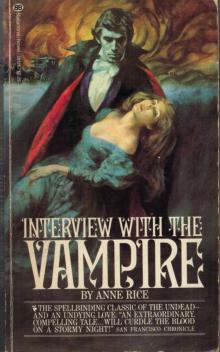 Interview with the Vampire
Interview with the Vampire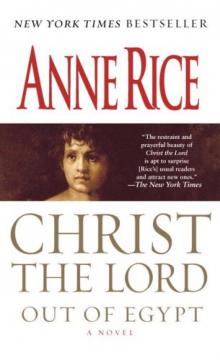 Christ the Lord: Out of Egypt
Christ the Lord: Out of Egypt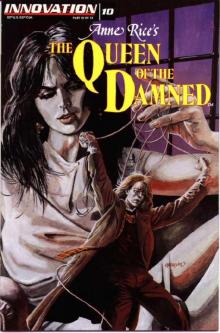 The Queen Of The Damned
The Queen Of The Damned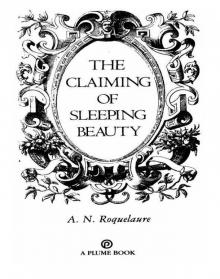 The Claiming of Sleeping Beauty
The Claiming of Sleeping Beauty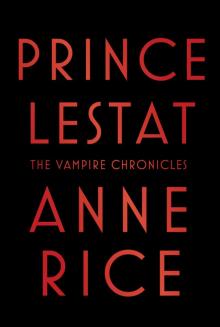 Prince Lestat
Prince Lestat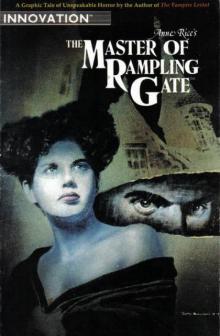 The Master of Rampling Gate
The Master of Rampling Gate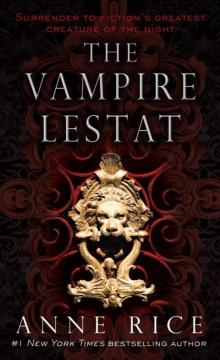 The Vampire Lestat
The Vampire Lestat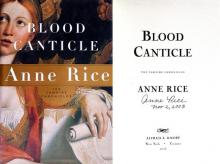 Blood Canticle
Blood Canticle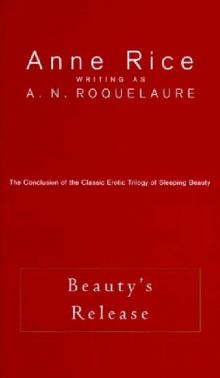 Beauty's Release
Beauty's Release Pandora
Pandora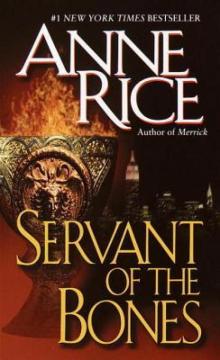 Servant of the Bones
Servant of the Bones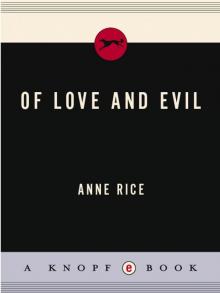 Of Love and Evil
Of Love and Evil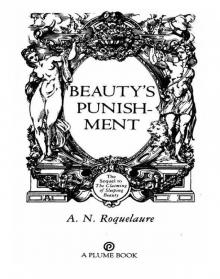 Beauty's Punishment
Beauty's Punishment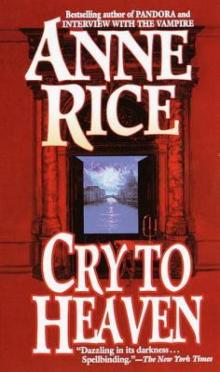 Cry to Heaven
Cry to Heaven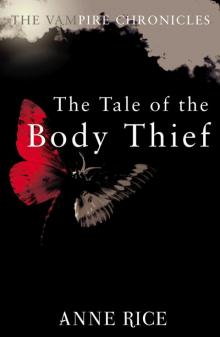 The Tale of the Body Thief
The Tale of the Body Thief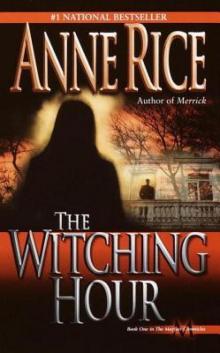 The Witching Hour
The Witching Hour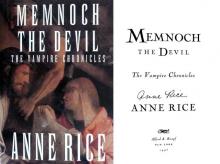 Memnoch the Devil
Memnoch the Devil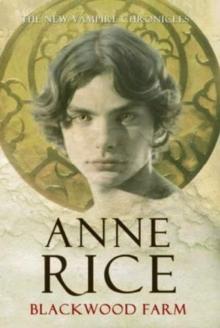 Blackwood Farm
Blackwood Farm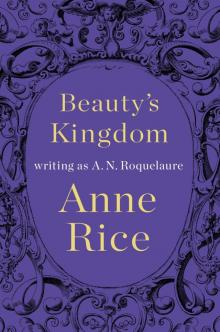 Beauty's Kingdom
Beauty's Kingdom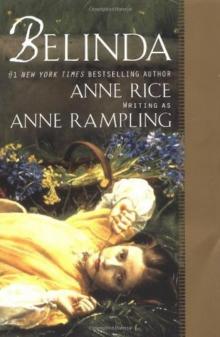 Belinda
Belinda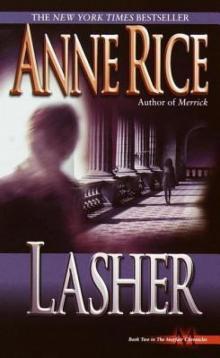 Lasher
Lasher Vittorio, the Vampire
Vittorio, the Vampire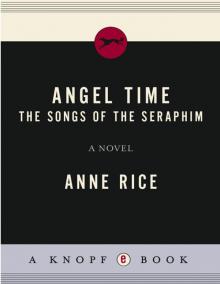 Angel Time
Angel Time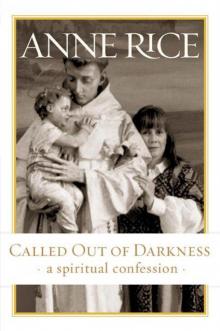 Called Out of Darkness: A Spiritual Confession
Called Out of Darkness: A Spiritual Confession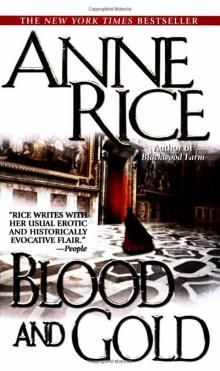 Blood And Gold
Blood And Gold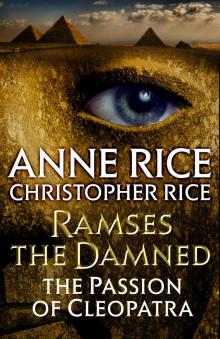 The Passion of Cleopatra
The Passion of Cleopatra Taltos
Taltos Exit to Eden
Exit to Eden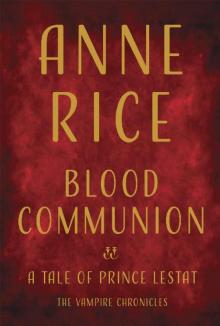 Blood Communion (The Vampire Chronicles #13)
Blood Communion (The Vampire Chronicles #13) The Wolf Gift
The Wolf Gift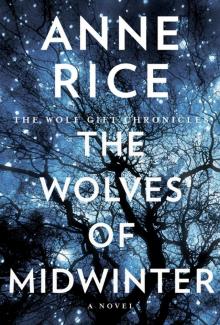 The Wolves of Midwinter
The Wolves of Midwinter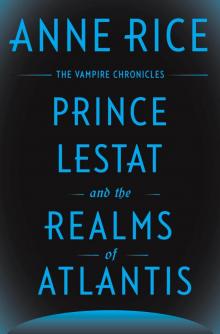 Prince Lestat and the Realms of Atlantis
Prince Lestat and the Realms of Atlantis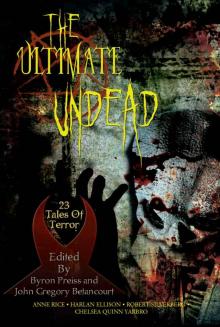 The Ultimate Undead
The Ultimate Undead The Vampire Lestat tvc-2
The Vampire Lestat tvc-2 The Road to Cana
The Road to Cana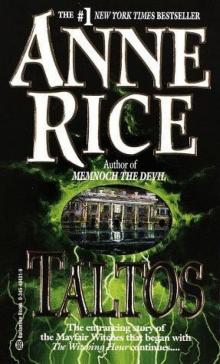 Taltos lotmw-3
Taltos lotmw-3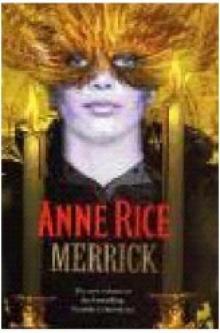 Merrick tvc-7
Merrick tvc-7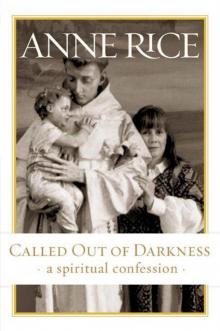 Called Out of Darkness
Called Out of Darkness Pandora - New Vampires 01
Pandora - New Vampires 01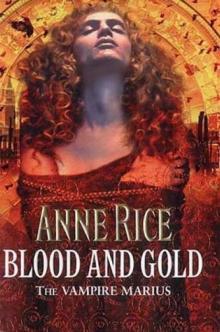 Bllod and Gold
Bllod and Gold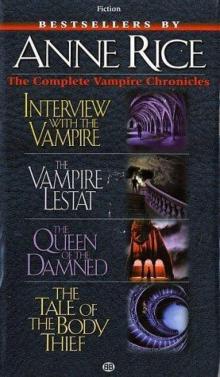 The Queen Of the Damned: Vampire Chronicles
The Queen Of the Damned: Vampire Chronicles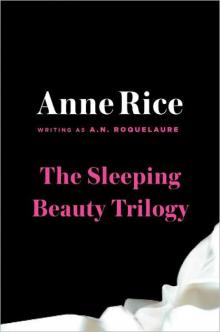 The Sleeping Beauty Trilogy
The Sleeping Beauty Trilogy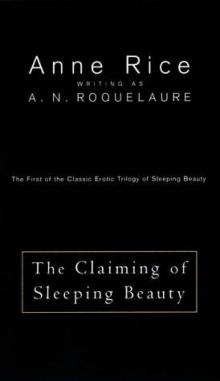 The Claiming of Sleeping Beauty b-1
The Claiming of Sleeping Beauty b-1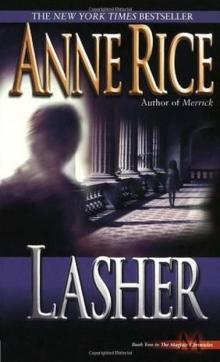 Lasher lotmw-2
Lasher lotmw-2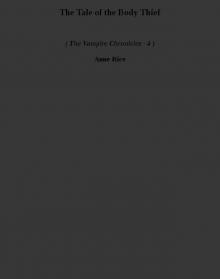 The Tale of the Body Thief tvc-4
The Tale of the Body Thief tvc-4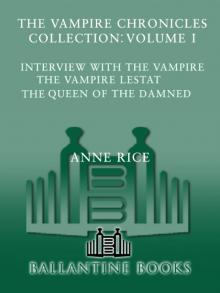 The Vampire Chronicles Collection
The Vampire Chronicles Collection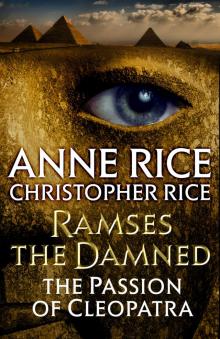 Ramses the Damned
Ramses the Damned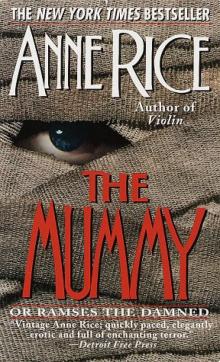 The Mummy - or Ramses the Damned
The Mummy - or Ramses the Damned Vittorio, The Vampire - New Vampires 02
Vittorio, The Vampire - New Vampires 02 The Vampire Armand tvc-6
The Vampire Armand tvc-6 Queen of the Damned tvc-3
Queen of the Damned tvc-3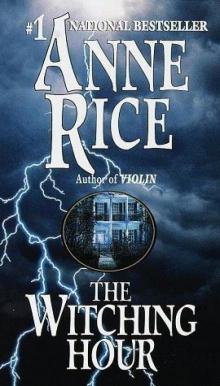 The witching hour lotmw-1
The witching hour lotmw-1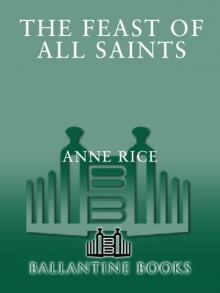 Feast of All Saints
Feast of All Saints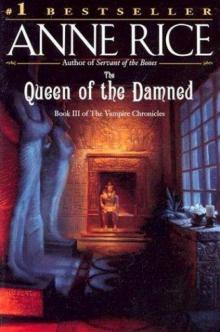 Queen of the Damned
Queen of the Damned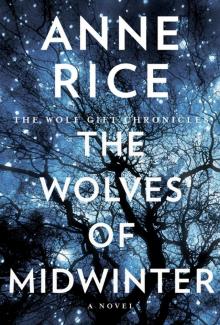 The Wolves of Midwinter twgc-2
The Wolves of Midwinter twgc-2 The Mummy
The Mummy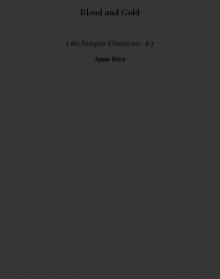 Blood and Gold tvc-8
Blood and Gold tvc-8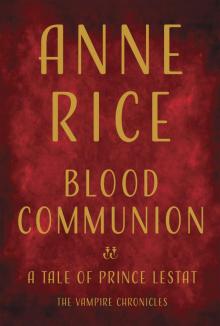 Blood Communion
Blood Communion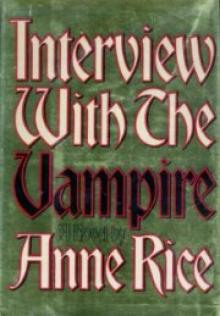 Interview with the Vampire tvc-1
Interview with the Vampire tvc-1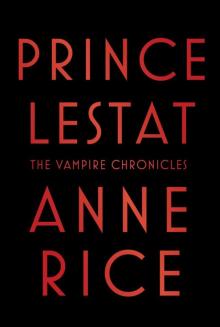 Prince Lestat: The Vampire Chronicles
Prince Lestat: The Vampire Chronicles